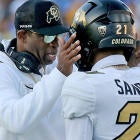Last winter, while having lunch with new Miami offensive coordinator James Coley, we got to talking about Florida State's 2012 season. Coley, the Noles former offensive coordinator, mentioned one of the secrets to the program's success had been this cutting-edge technology FSU had.
He said it was high-tech stuff from Australia. Coley was pretty vague on the details. Said it made a dramatic difference in the performance of their athletes, though. Like it cut down on their injuries by some 90 percent.
The guy behind it, he said, was hired by Mark Stoops when he took the head coaching job at Kentucky. I was fascinated to learn more about the technology and the innovative coach who brought it to FSU. Initially, I wanted to do a story on that guy, Kentucky High-Performance Coach, 32-year-old Erik Korem, but with the creation of our new Fast Football show on CBS Sports Network, it seemed like a natural to introduce his work there.
One of the key elements of the training program is an athlete tracking system, which Korem learned about while overseas studying Aussie rules football.
"The athlete tracking device is the hub for gathering data," Korem explains. "It uses GPS, accelerometers, magnetometers, gyroscopes and heart rate sensors to collect data. You can get information on biodynamics: speed, acceleration, impact, facing data (which direction the players are facing as they move: backpedal, moving right/left, etc.). In addition, you can get bioenergetic data: heart rate. (For more on this, Korem suggests exploring the catapults website.)
"Apart from athlete tracking we use Omegawave to gather data on athlete readiness by looking at heart rate variability, using ECG, and power output capabilities," Korem said. "We can determine how prepared an athlete is to practice or play by using this technology.
"In regards to technology, we are also developing a massive database system that helps us monitor wellness through subjective feedback and we input data on physiological output to help create injury prediction models."
Through the technology, Korem said the Noles did in fact reduce soft tissue injuries by 90 percent in 2012, a stat that no doubt would turn any football coach's head, although Korem concedes there was some luck involved in that.
"Took what they were great at it and applied a bit of science to it," he said. "Nothing surpasses listening to your athletes."
There many intriguing methods Korem, a former Texas A&M football player, has brought to UK. Among them, the reasoning behind not letting players wearing headsets while training.
"When we first started, that was a shock," Korem said. "But we showed them through some research that there's something called, 'Fight or Flight,' the sympathetic nervous system. When you're about to get into a game or a fight, your nervous system is excited. When you're constantly plugged into music, we found the body didn't have that natural response.
"So when we first started training, we wanted to teach these guys how to naturally control their arousal levels. It wasn't fun at the beginning, but then we explained to em, 'You've got to learn how to create your own music.' It started to click with them that you can control your level of excitement. You don’t want to be hooked on stimulus. Aside from that, we try to work with our guys on not wearing their headphones all the time on campus, because you miss out on the life. Music is great, but it shouldn't be used as the primary stimulus to get you ready to go all the time."
Where exactly will this technology go next and how widespread will it become?
"It's more than just technology, it's a mindset," Korem said. "I think it's going to have a tremendous impact. If you look internationally, and the reason I started branching and looking for other options, is if you look at Australia, they have a small population but they do enormous things in international competitions by applying science to what they're doing. Great Britain poured millions of dollars into state-sponsored sports programs. They employed the best coaches and sport scientist in the world and went from 10th (2000) to third place in 2012 in the summer Olympic Games.
"A lot of this really doesn't require a ton of money. It requires inquisitive minds and it requires people that have a bit of a different background."




















